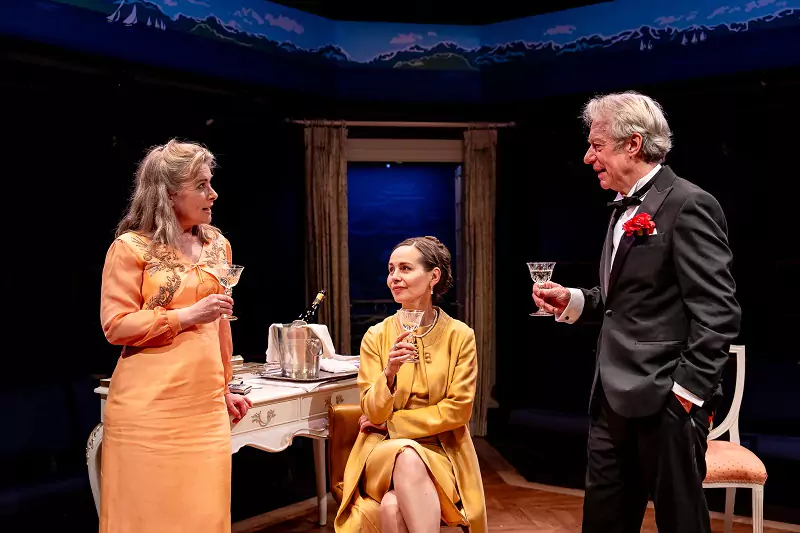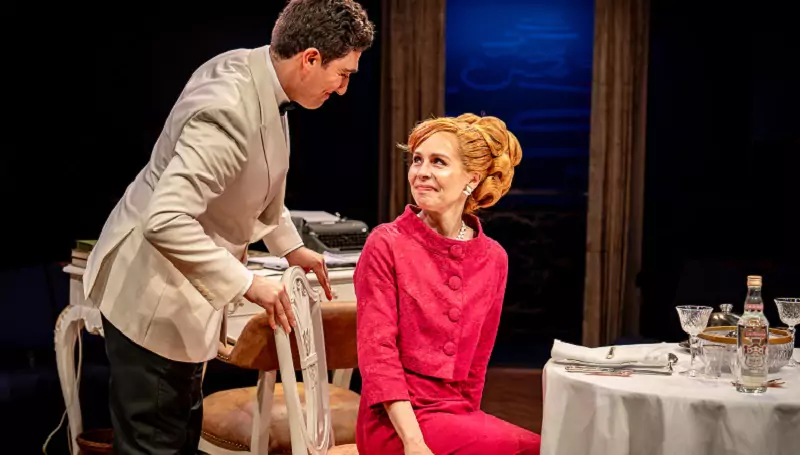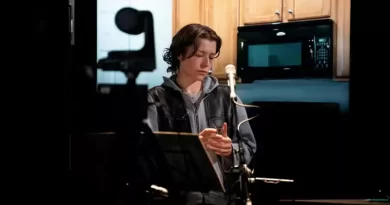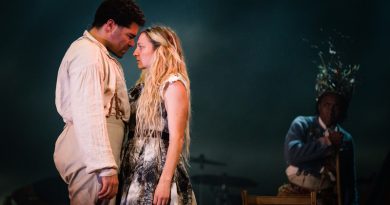“Suite in Three Keys” at the Orange Tree Theatre
Jane Edwardes in south-west London
7 June 2024
In 1965, Noël Coward finished three plays, one full-length and two short to be played on alternate nights. He set them all in a luxurious suite in the Beau Rivage Hotel in Lausanne, Switzerland, with three different characters and the same waiter in each play. He was pleased with the result. A year later, he starred in the plays, together with Irene Worth and Lilli Palmer, in what was to be his last appearance onstage, due to an increasingly unreliable memory. Suite in Three Keys was greeted with enthusiasm and became part of what Coward liked to refer to as ‘Dad’s Renaissance’.

Emma Fielding, Tara Fitzgerald and Stephen Boxer.
Photo credit: Steve Gregson.
Tom Littler’s production at the Orange Tree offers a rare chance to see all three in repertory, and to enjoy the way they reflect on each other. The tone is light, but the subjects serious. They poignantly reveal a man who is feeling his age, and who is preoccupied with mortality, the price of deception, and the responsibility to make of life what we can.
They make an entertaining challenge for Emma Fielding, Tara Fitzgerald, and Stephen Boxer, not forgetting Steffan Rizzi, who seizes every opportunity as the waiter. Learning the lines must have been quite a task in itself. While Fitzgerald’s characters hum to a similar theme, those played by Fielding and Boxer are markedly different.
Shadows of the Evening is the most pedestrian of the three. George, a publisher in his 50s, has been told that he only has months to live. He and his mistress, Linda, and his wife, Anne, meet in the hotel and have to decide how they are going to face up to his approaching death. They are clever, sophisticated people and six months of howling is out of the question. Anne and Linda are hardly the greatest of friends, and an attempt to be nice to each other is rightly dismissed as excruciating. Fighting is unacceptable as well, although Coward does enjoy writing a good ding-dong between his female characters. Fielding’s Anne is dowdy compared to Fitzgerald’s Linda, but her ugly combination of red trousers and red straw hat rather overdoes the point. She is the most direct and honest in her response, stating straightforwardly that ‘one loves as much as one can’.
The Americans in Come into the Garden, Maud are the only characters vulgar enough to refer to the cost of their suite. The theme in this, the lightest of the plays, is the familiar one of rich Americans being taken for a ride by wily Europeans. Fielding is splendid as the ghastly but vulnerable Anna-Mary, a social-climbing American in curlers, purple hair, and a billowing blue gown, reminiscent of Tanya in White Lotus. She is hysterically excited at the prospect of the dinner party she is holding that night for various minor aristocrats holed up in Lausanne. When one of the guests lets her down, she demands that her golf-playing husband should eat in the suite in order to avoid being thirteen for supper. Boxer’s worn-down Conklin is only too pleased to oblige, and even happier when Fitzgerald’s bohemian Maud pays him a visit, and, after checking that he really is mega-rich, offers an alternative to being harangued by his wife
A Song at Twilight is the main course with lashings of pink champagne to loosen tongues. For the first time, Coward poked his head out of the closet, just a year before the law allowing homosexuals to practise in private was passed. It must have been quite something to see him in the role of the celebrated writer, Hugo Latymer, who is extremely unpleasant, but also shares some of Coward’s own fears of having his privacy exposed. Boxer is magnificently waspish as the vile author, and quite frightening when he flies into a rage. He has a habit of shrinking his head into his body, like a tortoise, before he launches into the attack. His wife, Hilde (Fielding), is an unshockable, intelligent German woman, with few illusions about her vituperative husband.
Fitzgerald dances delicately round the point of her visit as Carlotta, a flirtatious actress with an enormous beehive. She has asked to see him after a break of many years. She reveals that she has letters that Hugo once wrote to the love of his life, a man. During their slightly over-long confrontation, he becomes convinced that she has come to ask for money, but, in fact, she is more interested in Hugo acknowledging the pain that his secrecy has caused, not just to himself, but also to those that surround him. Littler’s production stresses that change is just around the corner as the sound of a “Rolling Stones” concert can be heard wafting across the lake.
These are not vintage Coward. Unlike the best of his comedies where he never puts a word wrong, the dialogue can be flat-footed and lacking energy. But they are often amusing, bitter-sweet, and revealing of how the playwright was feeling towards the end of his life. The actors are all impressive, especially in the final play, good enough to benefit from being so close to the action. However, a little less motiveless shuffling around – the curse of theatre-in-the-round – would be a distinct advantage.









